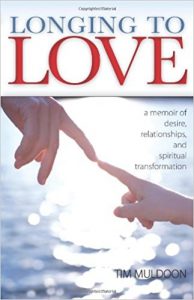Longing to Love: A Memoir of Desire, Relationships, and Spiritual Transformation
by Tim Muldoon
 “Falling in love is dangerous and therefore thrilling, because it means that your happiness is irrevocably tied up in the life of another sovereign creature,” Tim Muldoon writes in “Longing to Love.” He shares that insight at a point in this autobiographical story when he and his wife, Sue, have just adopted the second of two daughters from China.
“Falling in love is dangerous and therefore thrilling, because it means that your happiness is irrevocably tied up in the life of another sovereign creature,” Tim Muldoon writes in “Longing to Love.” He shares that insight at a point in this autobiographical story when he and his wife, Sue, have just adopted the second of two daughters from China.
Speaking of one daughter, Grace, he says, “I think she gets it when I tell her that I have fallen in love exactly three times in my life, and that she was time number two,” preceded by Sue and followed by their second daughter, Katie.
It would oversimplify Muldoon’s enjoyable, readable account to call it a reflection on the meaning of love in the context of marriage and the family. It is that, of course, but it is much more. His story of a pilgrimage that unfolded over the course of a decade and a half before and after he married is, naturally, complex. And it is not just his personal story, but the story of a marriage.
Muldoon, a lay theologian, was the inaugural director of the Church in the 21st Century Center at Jesuit-run Boston College. He now teaches at the college and serves in its Office of University Mission and Ministry.
So, what is this book really “about”? First, it is about beginning as a youth to grasp what real love is — and what it certainly is not. It is about courtship too and getting married.
In this regard, many readers are likely to identify with the author’s recollections of the first days after his wedding to Sue, which should draw into focus the value of any couple’s memories of early love. “The constant refreshment of these memories is a source of great consolation, a reservoir of living water from which we continue to draw even in times of desolation,” he writes.
But “Longing to Love” also is about one married couple’s profound desire to have children. The Muldoons’ struggle with infertility ultimately led them to the conclusion that they never would become “parents through pregnancy.”
Thus, adoption emerges as a theme in Muldoon’s story. And he candidly reveals that a process of conversion was required on his part before he finally achieved the realization that, indeed, he could become a parent in precisely this way.
Initially, Muldoon “couldn’t fathom becoming a parent through adoption.” But after he and Sue adopted Grace from China, he explains:
“I, who had been afraid of considering adoption at one time, was so enthralled by the experience that I couldn’t imagine not repeating it. … I’d grown in the conviction that adoption was part of our calling as a couple.”
Again, this is a book about marriage itself, since Muldoon’s pilgrimage is a reflective journey into his own marriage. I suspect readers will appreciate the down-to-earth ways he interrelates marriage with faith, and how he esteems marriage without slighting its complex realities. For example, he writes:
— “One great grace of married life is that shared desires tend to purify and even marginalize more selfish ones. I have learned to test my desires by understanding hers, mindful that those we share more often point us in the direction of what will make our lives happy.”
— “I recalled something that the priest celebrant at our wedding had said. … He knew us well, and his line hit the mark exactly: ‘You enter marriage imagining you’ll make sacrifices, and you end up making sacrifices you could never imagine.’ How right he was.”
— “Our early relationship began as a seed of friendship, which germinated in attraction and flowered into a transcontinental romance. But that was only the first phase of this pilgrimage.”
— “Because of [Sue], God has a human face, and it is a face that beckons me to become better than I am right now. I don’t need to engage in flights of imagination to know that God loves me.”
As I read “Longing to Love,” I felt it encompassed numerous points of beginning, and that was good. After all, the stages of a marriage call for spouses to begin again and again to grasp what love is asking of them at each given point in their life together.
For, as life changes and develops, the demands of love are constantly new — whether in the first years of marriage, or as couples contend with career options and demands, or when children enter a couple’s life, or as a family deals with all the seemingly impossible predicaments that arise for it.
In marriage and family life, “I have been pulled outside myself into a world that is much grander,” Muldoon tells readers. “By God’s mercy I have not been allowed to rest contently in the satisfaction of small desires.”
He is eager, Muldoon says, “to know what lies around the next corner.”
About the reviewer
David Gibson is the former, now-retired editor of Origins, CNS Documentary Service.
Disclaimer: Book reviews do not imply and are not to be used as official endorsement by the USCCB of the work or those associated with the work. Book reviews are solely intended as a resource regarding publications that might be of interest to For Your Marriage visitors.




